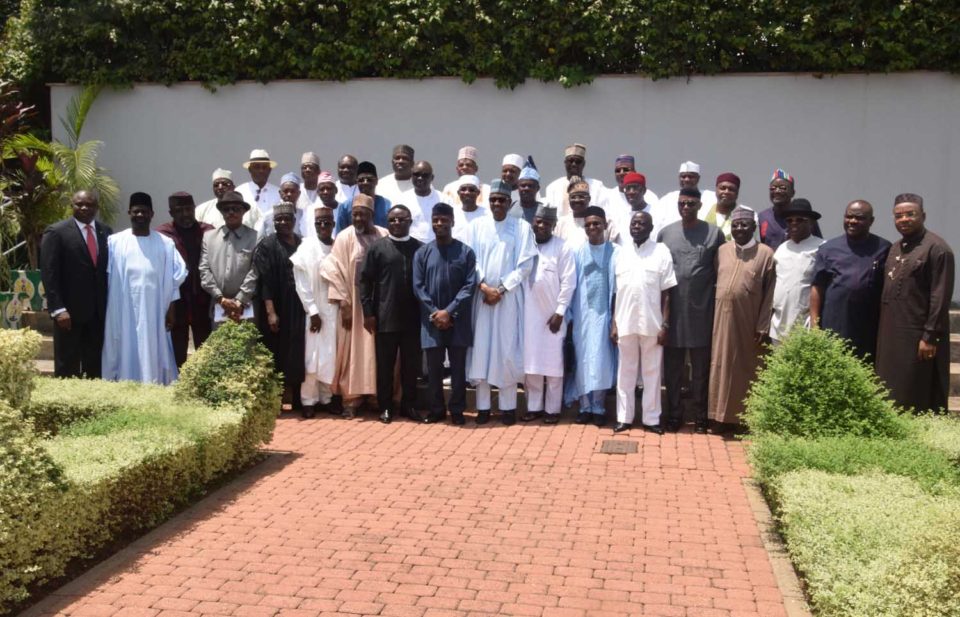
The recent meeting between President Muhammadu Buhari and governors of the 36 states regarding the financial situation in the country may not have come at a better time. The meeting was held for the purpose of discussing the option of a federal bail-out for the troubled states. Although reports suggests that the affected states are about 22, the task force team set up by the Nigerian Labour Congress to various geographical zones of the country however found out that the number of states affected by the economic crisis of non-payment of salaries are about 18. State affected includes Abia, Akwa Ibom, Benue, Bauchi, Cross River, Ekiti, Imo, Jigawa, Kano, Kastina, Kogi, Ogun, Oyo, Osun, Ondo, Plateau, Rivers, Zamfara.
By last month, Abia state reportedly owes the state Hospital Management Board 8months salaries. The state Universal Basic Education also hasn’t received their pay for over six months now. Same goes for polytechnic teachers and local government workers who are being owed salaries in various numbers of months. The most talked about state of Osun also reportedly haven’t paid salaries and pensions for the past seven and 11 months. Plateau state owed six months salaries and 7months pension while Benue owed its workers five months salaries and seven months pension. Kogi, state which had suddenly become a haven for kidnappers was said to owe four months in arrears of pension and salary payments while Oyo state under Isiaka Ajimobi was reported to owe three months in salaries and between five and 11 months of pension payments.
Explaining why he could not pay salaries to workers, Osun State Governor, Ogbeni Rauf Aregbesolasaid it was due to “the declining federal allocation to the state. Federal allocation to the state reduced by 40 per cent since 2013, making it difficult for government to meet up its responsibilities”. The governor, who added that the government went ahead to accumulate debt in its bid to ensure that salaries were paid, said the “banks would not grant more loans”. The dwindling federation account may likely be the excuse for many other affected states.
Although former Minister of Finance, Dr Ngozi Okonjo Iweala blamed the governors for not prioritizing salaries, the meeting between the governors and President Muhammadu Buhari revealed that the Federal Government actually owes some states for Federal Government project carried out in their respective states. Chairman, Nigerian Governor’s forum and Governor of Zamfara state Abdulaziz Yari said governors were not interested bailout but wanted the Federal Government to refund sums being owed them. He also disclosed that Nigeria’s 36 states were in debt to the tune of N658 billion while the federal government was owing N5.5trillion on the domestic front alone.
There are reports suggesting that 21 states can really be described as highly indebted with an estimated total debt profile of N1.58 trillion as at May 29, 2015. States like Lagos under former Governor Babatune Raji Fashola and Kano state under the immediate past administration of Dr. Rabi’u Kwankwaso are said to have accrued debt to the tune of N418.2billion and N294.5billion respectively. The Rivers state led by Rotimi Amaechi was reported to have accumulated N138.3 billion while Jigawa under Sule Lamido was indebted to the tune of N117billon.
Other highly indebted states like Akwa Ibom, Kaduna, and Benue, Imo, Edo Ogun and others are all indebted in amounts ranging from N27billion to N125billion. As a matter fact, based on the huge debt profile of the state governments, the Federal Government had last year directed deposit money banks not to grant fresh loans to state governors until they get approval and clearance from the Federal Ministry of Finance.
As states battle to find a way out of this debacle, there have been outcries and threats from various quarters on the imminent impact on the states affected. Factional Vice President of the Nigerian Labour Congress (NLC), Mr Issa Aremu, expressed concern over non-payment of workers’ salaries and described the situation as unacceptable, a wage theft, and economic crime.
Some states civil servants have at some point in time threatened to embark on strike due to unpaid salaries. Just last month, the Nigerian Labour Congress and the Trade Union Congress threatened to go on strike over the inability of the Bauchi State Government to pay workers’ salaries in April and May.
Already, some of the new governors have ordered reversal of the recruitment of members of staff conducted in the last two years, saying their government cannot employ more workers when they have no money to pay their present workforce. Experts say the huge debts will make it difficult for the new state governments to embark on new development projects or employ fresh hands given the level of unemployment in the country.
The Socio-Economic Rights and Accountability Project (SERAP) has already dragged state and the Federal Governments to International Labour Organisation (ILO), to examine systematic and egregious non-observance of Convention No 29 on Forced Labour and other international standards on the right of workers to timely payment of salaries.
